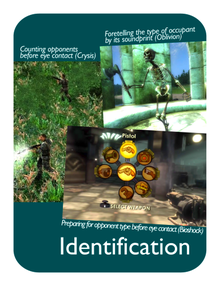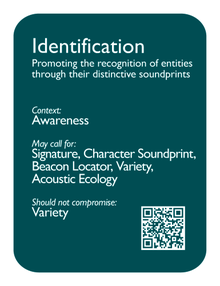Difference between revisions of "Identification"
ValterAlves (Talk | contribs) |
ValterAlves (Talk | contribs) m |
||
| (35 intermediate revisions by the same user not shown) | |||
| Line 2: | Line 2: | ||
| name =Identification | | name =Identification | ||
| deckversion =1.0 | | deckversion =1.0 | ||
| − | | | + | | v10synopsis =Promoting the recognition of entities through their distinctive soundprints |
| + | | v20synopsis =Promoting the recognition of entities through their distinctive soundprints | ||
| patternpresentation = | | patternpresentation = | ||
| cardpresentation= | | cardpresentation= | ||
| − | | | + | | v10frontface =Identification-front-v10.png |
| − | | | + | | v10backface =Identification-back-v10.png |
| + | | v20frontface =Identification-front-v20.png | ||
| + | | v20backface =Identification-back-v20.png | ||
| screenshots= | | screenshots= | ||
| − | | | + | | v10rel-tag1=Context:<br> |
| − | | | + | | v10rel1=[[Awareness]]<br> |
| − | | | + | | v10rel-tag2=May call for:<br> |
| − | | | + | | v10rel2=[[Signature]], [[Character Soundprint]], [[Beacon Locator]], [[Requisite Variety]], [[Acoustic Ecology]]<br> |
| − | | | + | | v10rel-tag3=Should not compromise:<br> |
| − | | | + | | v10rel3=[[Requisite Variety]]<br> |
| + | | v20rel-tag1=Context:<br> | ||
| + | | v20rel1=[[Awareness]]<br> | ||
| + | | v20rel-tag2=May call for:<br> | ||
| + | | v20rel2=[[Signature]], [[Character Soundprint]], [[Beacon Locator]], [[Variety]], [[Acoustic Ecology]]<br> | ||
| + | | v20rel-tag3=Should not compromise:<br> | ||
| + | | v20rel3=[[Variety]]<br> | ||
| revisions =Introduced in version 1.0 | | revisions =Introduced in version 1.0 | ||
| + | | description = | ||
| + | [[Identification]] refers to the ability to associate soundprints with their source entities – be they NPC, resources, or other objects in the world. <br /> | ||
| + | In the case of characters, [[Identification]] consists of the perception of their [[Character Soundprint]].<br /> | ||
| + | [[Identification]] potentiates accurate behaviour, reduces ambiguities and sets the context that in turn allows completing their representation.<br /> | ||
| + | |||
| + | In terms of gameplay, the kind of [[Awareness]] provided by [[Identification]] is especially relevant when in absence of visual contact with the emitting source.<br /> | ||
| + | [[Beacon Locator|Beacon Locators]] constitute one further exploration that exaggerates the acoustic presence of an entity to make it more noticed and localizable.<br /> | ||
| + | In games that support [[Stealth]] behaviour or that are open-world enough to provide alternative roaming, [[Identification]] of NPC is instrumental. | ||
| + | |||
| + | In all cases, the adoption of [[Signature]] soundprints, by definition, contributes to [[Identification]] and allows refined reaction. For instance, if different types of opponents have distinctive [[Chitchat]] or [[Foley]], the player can readily draw up the appropriate weapons, before eye contact. | ||
| + | |||
| + | The issue of [[Variety]], which concerns the perception of repetition, becomes more complex when different entities are not all treated alike, as it is the case implied by [[Identification]]. In this case [[Variety]] applies not only among the whole set of entities but also for each particular kind of entity. | ||
| + | |||
| + | The design of the sounds that will eventually turn a identity identifiable calls for the appreciation of the [[Acoustic Ecology]] of the game, of which such new sounds will eventually become part of. | ||
| + | | examples= | ||
| + | | ex2=<mt p="Identification" g="Bioshock" altg="BioShock" w="{{R16by9W}}" h="{{R16by9H}}">Big Daddies' [[Character Soundprint]] allows their [[Identification]] before Eye Contact. This is important because unlike many other NPC in the game, the player wants to find them. Prompt [[Identification]] of the specific type of enemy is crucial in this game due to the need to timely readying the proper weapons. This is possible thanks to their [[Signature]]s. For instance Spider Slicers are very quick, attack from the roof, and only a certain characteristic sound allows spotting them before actual eye contact.</mt> | ||
| + | | ex4=<mt p="Identification" g="Oblivion" altg="The Elder Scrolls IV: Oblivion" w="{{R16by9W}}" h="{{R16by9H}}">Foes are usually clearly audible which is relevant in terms of exploration of the spaces.</mt> | ||
| + | | ex6=<mt p="Identification" g="Crysis" w="{{R4by3W}}" h="{{R4by3H}}">In this circumstance the soldiers' talk avoids that the PC unwillingly exposes himself and runs in a direct confrontation. Also, the talk tells beforehand that there is more than one soldier.</mt> | ||
| + | | ex5=<mt p="ShoutAndYell" g="Infamous" altg="inFamous" w="{{R16by9W}}" h="{{R16by9H}}">Harmful NPC make themselves announce.</mt> | ||
| + | | ex1=<mt p="Identification" g="Silent Hill" w="{{R16by9W}}" h="{{RSHH}}">The radio that Harry carries with him emits a static interference that allows identifying nearby creatures.</mt> | ||
| + | | ex3=<mt p="Identification" g="Ocarina Of Time" altg="The Legend of Zelda: Ocarina of Time" w="{{R4by3W}}" h="{{R4by3H}}">These bats make a sound that allows acknowledging that they are close by.</mt> | ||
| + | <!--| ex6=<mt p="Identification" g="Infamous" altg="inFamous" w="{{R16by9W}}" h="{{R16by9H}}">This kind of NPC is extremely dangerous because it throws itself against Cole, full explosives. Still it has a particular Signature that allows its Identification and prompt reaction.</mt>--> | ||
| + | | ex7=<mt p="Identification" g="Halo" altg="Halo: Reach" w="{{R16by9W}}" h="{{R16by9H}}">A case when the [[Relaxation]] following an apparently solved [[Engagement]] is interrupted by the [[Identification]] of a powerful opponent's [[Character Soundprint]].</mt> | ||
}} | }} | ||
Latest revision as of 20:16, 24 August 2012

|

| |
| The card's front face | The card's back face |
Contents
Synopsis
| Promoting the recognition of entities through their distinctive soundprints. |
Relationships
Context:
Awareness ![]() .
.
May call for:
Signature ![]() , Character Soundprint
, Character Soundprint ![]() , Beacon Locator
, Beacon Locator ![]() , Variety
, Variety ![]() , Acoustic Ecology
, Acoustic Ecology ![]() .
.
Should not compromise:
Variety ![]() .
.
Description
Identification refers to the ability to associate soundprints with their source entities – be they NPC, resources, or other objects in the world.
In the case of characters, Identification consists of the perception of their Character Soundprint.
Identification potentiates accurate behaviour, reduces ambiguities and sets the context that in turn allows completing their representation.
In terms of gameplay, the kind of Awareness provided by Identification is especially relevant when in absence of visual contact with the emitting source.
Beacon Locators constitute one further exploration that exaggerates the acoustic presence of an entity to make it more noticed and localizable.
In games that support Stealth behaviour or that are open-world enough to provide alternative roaming, Identification of NPC is instrumental.
In all cases, the adoption of Signature soundprints, by definition, contributes to Identification and allows refined reaction. For instance, if different types of opponents have distinctive Chitchat or Foley, the player can readily draw up the appropriate weapons, before eye contact.
The issue of Variety, which concerns the perception of repetition, becomes more complex when different entities are not all treated alike, as it is the case implied by Identification. In this case Variety applies not only among the whole set of entities but also for each particular kind of entity.
The design of the sounds that will eventually turn a identity identifiable calls for the appreciation of the Acoustic Ecology of the game, of which such new sounds will eventually become part of.
Examples
  BioShock: Big Daddies' Character Soundprint allows their Identification before Eye Contact. This is important because unlike many other NPC in the game, the player wants to find them. Prompt Identification of the specific type of enemy is crucial in this game due to the need to timely readying the proper weapons. This is possible thanks to their Signatures. For instance Spider Slicers are very quick, attack from the roof, and only a certain characteristic sound allows spotting them before actual eye contact.
|
  Halo: Reach: A case when the Relaxation following an apparently solved Engagement is interrupted by the Identification of a powerful opponent's Character Soundprint.
|




